
Madama Butterfly is an opera in three acts by Giacomo Puccini, with an Italian libretto by Luigi Illica and Giuseppe Giacosa.

Arms and the Man is a comedy by George Bernard Shaw, whose title comes from the opening words of Virgil's Aeneid, in Latin: Arma virumque cano.
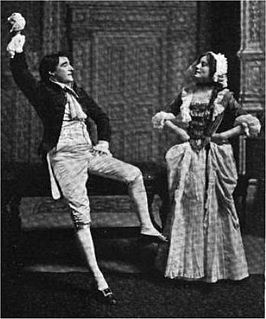
She Stoops to Conquer is a comedy by Oliver Goldsmith, first performed in London in 1773. The play is a favourite for study by English literature and theatre classes in the English-speaking world. It is one of the few plays from the 18th century to have retained its appeal and is still regularly performed. The play has been adapted into a film several times, including in 1914 and 1923. Initially the play was titled Mistakes of a Night and the events within the play take place in one long night. In 1778, John O'Keeffe wrote a loose sequel, Tony Lumpkin in Town.

Susan Hampshire, Lady Kulukundis, is an English actress known for her many television and film roles. A three-time Emmy Award winner, she won for The Forsyte Saga in 1970, The First Churchills in 1969, and for Vanity Fair in 1973. Her other television credits include The Pallisers (1974), The Grand (1997–98) and Monarch of the Glen (2000–2005).
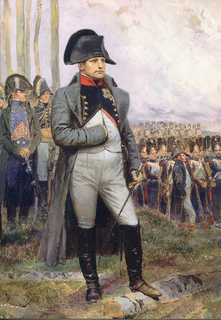
Napoleon I, Emperor of the French, has become a worldwide cultural icon generally associated with tactical brilliance, ambition and political power. His distinctive features and costume have made him a very recognizable figure in popular culture.

An Ideal Husband is a four-act play by Oscar Wilde that revolves around blackmail and political corruption, and touches on the themes of public and private honour. It was first produced at the Haymarket Theatre, London in 1895 and ran for 124 performances. It has been revived in many theatre productions and adapted for the cinema, radio and television.

"The Adventure of the Second Stain", one of the 56 Sherlock Holmes short stories written by Sir Arthur Conan Doyle, is one of 13 stories in the cycle collected as The Return of Sherlock Holmes (1905) and the only unrecorded case mentioned passively by Watson to be written. It was first published in The Strand Magazine in the United Kingdom in December 1904, and was also published in Collier's in the United States on 28 January 1905. Doyle ranked "The Adventure of the Second Stain" eighth in his list of his twelve favourite Holmes stories.

Cyrano de Bergerac is a play written in 1897 by Edmond Rostand. There was a real Cyrano de Bergerac, and the play is a fictionalisation following the broad outlines of his life.
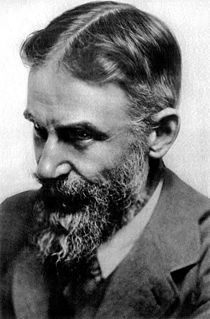
Candida, a comedy by playwright George Bernard Shaw, was written in 1894 and first published in 1898, as part of his Plays Pleasant. The central characters are clergyman James Morell, his wife Candida and a youthful poet, Eugene Marchbanks, who tries to win Candida's affections. The play questions Victorian notions of love and marriage, asking what a woman really desires from her husband. The cleric is a Christian Socialist, allowing Shaw—himself a Fabian Socialist—to weave political issues, current at the time, into the story.
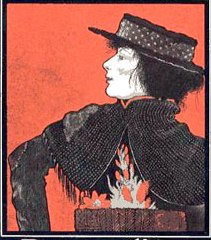
Pygmalion is a play by George Bernard Shaw, named after the Greek mythological figure. It premiered at the Hofburg Theatre in Vienna on 16 October 1913 and was first presented in German on stage to the public in 1913. Its English-language premiere took place at Her Majesty's Theatre in the West End in April 1914 and starred Herbert Beerbohm Tree as phonetics professor Henry Higgins and Mrs Patrick Campbell as Cockney flower girl Eliza Doolittle.

The Emperor's New Clothes is a 2001 British historical drama film that was adapted from Simon Leys' novel The Death of Napoleon. Directed by Alan Taylor, the film stars Ian Holm as Napoleon and Eugene Lenormand, a Napoleon look-alike, Iben Hjejle as Nicole 'Pumpkin' Truchaut and Tim McInnerny as Dr Lambert. The plot re-invents the (secret) history surrounding Napoleon Bonaparte's exile to Saint Helena following his defeat at Waterloo.
No Wit, No Help Like a Woman's is a Jacobean tragicomic play by Thomas Middleton.

How He Lied to Her Husband is a one-act comedy play by George Bernard Shaw, who wrote it, at the request of actor Arnold Daly, over a period of four days while he was vacationing in Scotland in 1904. In its preface he described it as "a sample of what can be done with even the most hackneyed stage framework by filling it in with an observed touch of actual humanity instead of with doctrinaire romanticism." The play has often been interpreted as a kind of satirical commentary on Shaw's own highly successful earlier play Candida.

L'irato, ou L'emporté is an opéra-comique in one act by the French composer Étienne Méhul with a French-language libretto by Benoît-Joseph Marsollier. It was first performed at the Théâtre Favart in Paris on 17 February 1801. Written in a lighter style than Méhul's operas of the 1790s, L'irato is famous for being part of a deception the composer played on his friend Napoleon Bonaparte.
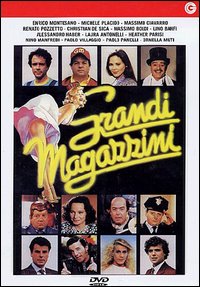
Grandi magazzini is a 1986 Italian anthology-comedy film directed by Castellano & Pipolo.

Village Wooing, A Comedietta for Two Voices is a play by George Bernard Shaw, written in 1933 and first performed in 1934. It has only two characters, hence the subtitle "a comedietta for two voices". The first scene takes place aboard a liner, the second in a village shop. The characters are known only as "A" and "Z".

Beauty's Duty (1913) is a short uncompleted "playlet" by George Bernard Shaw. It is a dialogue between a man and his lawyer about the man's wife. The husband has traditional views on marriage. The wife is more idiosyncratic in her thinking.

Press Cuttings (1909), subtitled A Topical Sketch Compiled from the Editorial and Correspondence Columns of the Daily Papers, is a play by George Bernard Shaw. It is a farcical comedy about the suffragettes' campaign for votes for women in Britain. The play is a departure from Shaw's earlier Ibsenesque dramas on social issues. Shaw's own pro-feminist views are never articulated by characters in the play, but instead it ridicules the arguments of the anti-suffrage campaigners.
Man of Destiny is a 1963 Australian television play directed by Christopher Muir. It was based on the 1897 play Man of Destiny by George Bernard Shaw. Just like the play it revolves around the early career of Napoleon Bonaparte.

Village Wooing is a 1962 Australian television play directed by William Sterling and starring Michael Denison and Dulcie Gray who were touring Australia at the time. It was based on the play by George Bernard Shaw.















